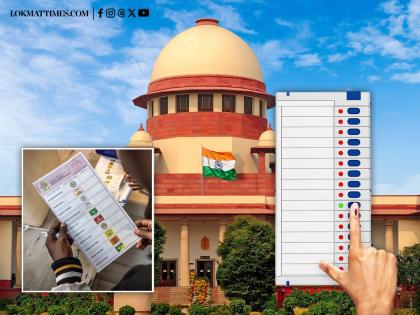Supreme Court Rejects Petition to Scrap EVMs for Ballot Papers, Calls Accusations Baseless
By Lokmat English Desk | Updated: November 26, 2024 17:20 IST2024-11-26T17:17:06+5:302024-11-26T17:20:56+5:30
Oppositions are blaming Electronic Voting Machines (EVMs) for their electoral losses, alleging that the ruling party tampered with the ...

Supreme Court Rejects Petition to Scrap EVMs for Ballot Papers, Calls Accusations Baseless
Oppositions are blaming Electronic Voting Machines (EVMs) for their electoral losses, alleging that the ruling party tampered with the machines to steal votes, and they advocate for a return to ballot paper elections, as practiced in over 150 countries. A public interest litigation (PIL) was filed in the Supreme Court over this issue. However Supreme Court dismissed the petition seeking to halt EVM usage and revert to ballot papers, rejecting claims of tampering.
पुन्हा कागदी मतपत्रिकांद्वारे मतदान नाही - सर्वोच्च न्यायालयाचा निर्णय@SpokespersonECI@ECISVEEP@MahaDGIPRpic.twitter.com/5ZY2xV1oKy
— ChiefElectoralOffice (@CEO_Maharashtra) November 26, 2024
Justices Vikram Nath and P. B. Varale criticized the petition, asserting, "EVMs are reliable when winning but deemed tampered when losing." The petition, filed by K.A. Paul, contended that EVMs can be easily manipulated and should therefore be replaced, citing comments from Elon Musk to support the argument. Paul highlighted that political figures like Chandrababu Naidu and Y.S. Jagan Mohan Reddy have previously questioned EVM reliability. The court responded, stating, "When leaders like Naidu or Jagan lose, they blame EVMs, but when they win, they raise no concerns. What does that tell us?"
Also Read: Madhya Pradesh Horror: Forest Guards Escape Tiger Attack in Satpura Reserve, Watch the Viral Video
The bench further questioned, "Why do tampering allegations surface only after losses? Why not follow international standards?" Additionally, the petition called for the Central Election Commission (CEC) to enforce stricter penalties for electoral misconduct, suggesting a five-year ban for candidates found guilty of bribery. Ultimately, the Supreme Court reaffirmed its faith in EVMs, emphasizing that accusations of tampering often stem from political motives rather than solid evidence.
Open in app